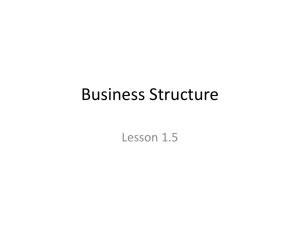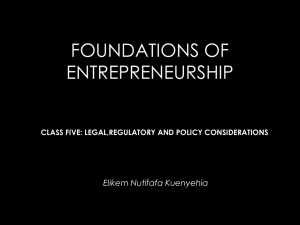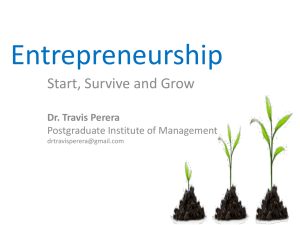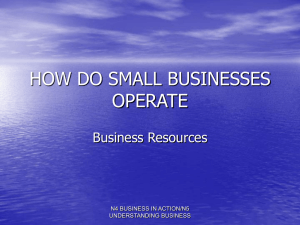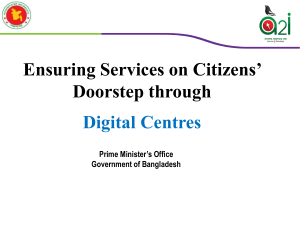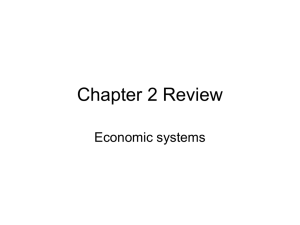Class 5 Slides - elikem nutifafa kuenyehia
advertisement
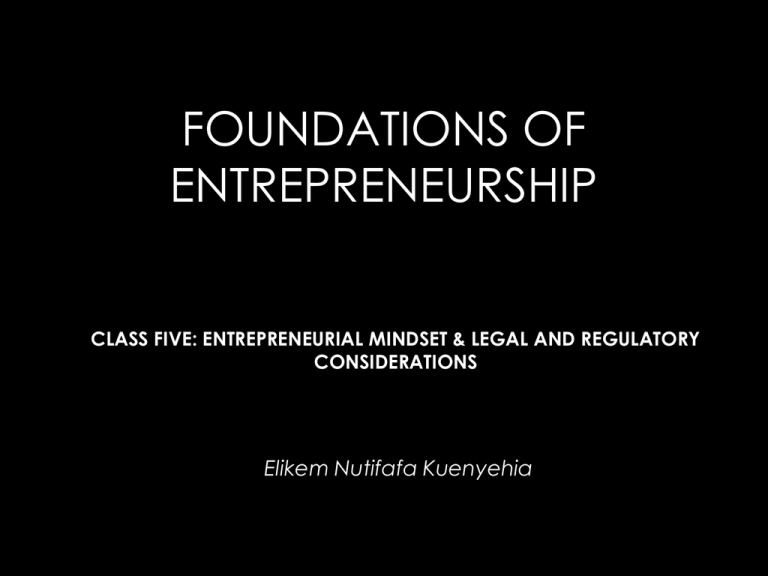
FOUNDATIONS OF ENTREPRENEURSHIP CLASS FIVE: ENTREPRENEURIAL MINDSET & LEGAL AND REGULATORY CONSIDERATIONS Elikem Nutifafa Kuenyehia Agenda For Class Five • Recap of last class • Continuation from last class • • • • • • Traits of a successful entrepreneur Are entrepreneurs born or made? Other issues relating to the entrepreneur Legal and regulatory considerations Forms of business organisations Guest Speaker: Kwabena Adu-Kusi, Managing Partner, Law Bureau Recap of Class Four • What did you learn from ‘The King of Travel’: Pak-Wo Shum? • What did you learn from Catherine Krobo Edusei Benson, Founder of Eden Tree Ghana Limited? • What did you learn from the entrepreneur and the entrepreneurial mindset? Traits of A Successful Entrepreneur • • • • • • • • • • • Interpersonal skills Ability to become connected Dynamic leadership & Vision Self Confidence & Optimism Salesmanship Passion Willingness to take risks Flexibility Unsentimental Disciplined Future-oriented Traits (con't) • • • • • • • • • • • Organised Opportunity obsessed Initiative Desire for responsibility Realistic Energetic & Hardworking Sense of Mission Tolerance for ambiguity Committed (to the venture) Resilient Resourcefulness/Creativity Other factors influencing entrepreneurs • Entrepreneur’s background • Age • Educational level Are Entrepreneurs born or made? • Class Discussion Behaviours typical of Ghanaian Entrepreneurs • • • • • • • • • • • Unable to separate ‘self’ from business Personality driven Lack of planning Do not listen Spread too thinly Lack of trust Desire for Control Cut corners Limited management expertise Inability to think big Competency dependence Why Entrepreneurs Fail? • Environmental reasons • Over-optimism • Over engagement in task oriented activities • Approach to decision making • Inability to recognise when entrepreneur must give way to manager • Lack of discipline/Focus • Underestimation of competition • Inadequate investment in product or service development Avoiding Failure? • • • • • • • • Find the right people Give them freedom to succeed Broaden the conversation Get the right knowledge Prepare a business plan Manage financial resources Adapt, evaluate, course correct Don’t spread thinly Different Types of Entrepreneurs • • • • • • • • Lifestyle vs. high growth entrepreneurs Religious entrepreneurs Political entrepreneurs Social entrepreneurs Opportunity vs. necessity entrepreneurs Intrapreneurs Extrapreneurs The State? • • • • • • • • • • • Some celebrated Ghanaian entrepreneurs Prince Kofi Amoabeng Alhaji Asoma Banda Ernest Bediako Sampong Mark Davies Herman Chinery- Hesse Dr. (Mrs.) Esther Ocloo Ken Ofori-Atta Sandy Osei-Agyeman Mrs Elizabeth Villars Kwasi Twum Kwaku Bediako Forms of business organisations • • • • • • Sole Proprietorship Partnership Limited liability company Unlimited liability company External Company Cooperative Sole Proprietorship • Most common form of business organisation in Ghana • Business owned (and typically also run) by a single individual • The sole proprietor and the business are essentially one – No distinction at law – No distinction between the entrepreneur and the enterprise – No limitation on liability Sole Proprietorship (cont’d) • If carrying out business in his true personal name, surname or initials no formality required • But if using name different from true surname, name, initials must register under Registration of Business Names Act • Certificate of registration to be renewed annually to be able to use the name Sole Proprietorship (cont’d) • Reg. Of Business Name separate from intellectual property registration which gives intellectual property rights to the name • Sole Proprietor has sole responsibility for decisions relating to business • No fetters on authority so long as lawful • No requirement for board • No obligation to disclose information or financials Partnership • An association of two or more individuals carrying on business for the purpose of making a profit • Must be incorporated under Incorporated Private Partnerships Act 1962 • Maximum number of individuals = 50 • Partners must be of sound mind & not have been convicted of dishonesty offence in last five years Partnership (cont’d) • Is a legal person separate from its partners – May be sued and sue in its own name, own assets etc • Partners share decision making, profits and losses • Partners jointly and severally liable with the firm and the other partners for all the debts and obligations of the firm Partnership (cont’d) • Passive/Sleeping vs. Active partners – Key decisions involving all partners • Individual partners taxed on their share of partnership profits – Each treated as a sole proprietor for tax purposes • Required to keep proper accounts • Required to produce financial statements – No requirement for audit but highly advisable Partnership agreement provisions • • • • • • • • • • • • Commencement Name Financial Contribution Profit (or Loss) Share Ownership of partnership assets Drawings and/or salaries Decision making Dissolution Payment in event of death or retirement Restraint of trade following departure Dispute resolution (litigation & arbitration) Governing Law Companies • Regulations – constitution of the company • Types: – Limited liability • Liability limited to amount paid for the shares • Generally, shareholders cannot be held liable for liability of company • Assets of Directors not available for company’s creditors – Unlimited liability • Not generally used or suitable for entrepreneurial ventures ; though some professional firms use this Companies • Incorporating a company • Incorporation documents to the Registrar of Companies o o o o o o o Regulations Form 3 Form 4 Registration and presentation fee A sum equivalent to 0.5% of the stated capital for public companies and GH¢500 for private companies Types of Companies • Limited by shares – Owners given shares for money they contribute – Liability tied to shares purchased – Shareholders paid dividend from profits if and when declared • Limited by guarantee – No shares issued – Members liability tied amount members agree to contribute if company winds up External Companies • Company incorporated outside Ghana establishes a ‘branch’ in Ghana • No separate legal personality from parent • Obtain external company status by filing certain documents and Registrar informing you that registered in register of external companies • Must have a Local Manager & a local process agent Co-operatives • Association set up to provide service (s) or benefit(s) for its members • Typically made up of members with similar characteristics (same employer, trade, profession) • May be incorporated or just be a body of individuals – Where incorporated must have word ‘cooperative’ after its name • Not permitted to grant loans to anyone other than their members Co-operatives (cont’d) • Registered under the Cooperative Societies Decree 1968 • Must have a minimum of ten members • Members of co-operative are liable for debts of the co-operative • Separate legal personality – can sue and be sued in its own name Other forms of business organisations • Joint Venture – 2 or more businesses pool resources to achieve a common objective – Can be established by agreement or by setting up a JV limited liability company Other forms of business organisations • Franchising – An agreement where an owner of a business format, trademark, trade name or copyright (the franchisor) gives the right to another (the franchisee) to sell products or services under the franchisor’s trade name and/or to use his systems and business formula Other forms of business organisations • Principal/Agency – Agent acts on behalf of principal in relation to 3rd parties – Ultimate liability for far as 3rd parties are concerned is the principal’s • Mergers & Acquisition – Not a separate business form – Typically involve 2 or more companies coming together to form a single entity Other Legal Considerations • • • • • • • • • Internal Revenue Act, 2000 (Act 592) National Pensions Act, 2008 (Act 766) Value Added Tax, 1998 (Act 546) Ghana Investment Promotion Centre (‘GIPC’) Act, 1994(Act 478) Immigration Labour Issues Factory, Office and Shop Regulations Free Zone Act,1995 (Act 504) Workmen’s Compensation Regulations Guest Speaker • Kwabena Adu-Kusi, Managing Partner, Law Bureau
